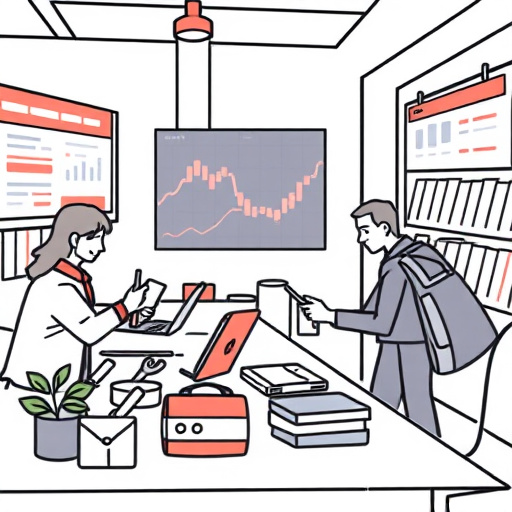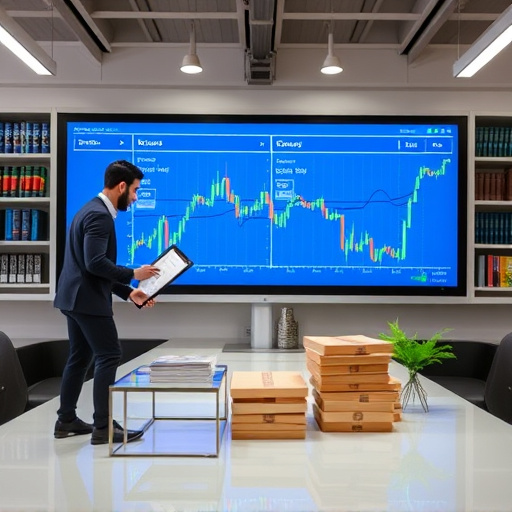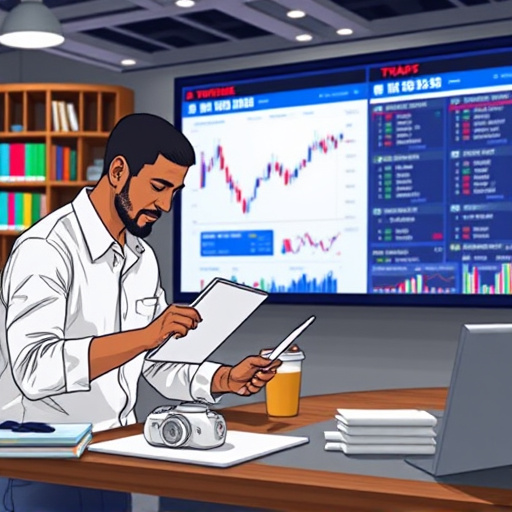Contracts for Difference (CFDs) allow traders to speculate on asset price movements without owning them. Australian traders should choose a reputable ASIC-regulated broker, set up an account, learn trading strategies, and master risk management due to CFDs' high-risk, high-reward nature. They trade by buying or selling CFDs based on market analysis, adjusting leverage, and using stop-loss orders.
“New traders looking to enter the Australian financial markets can benefit from exploring Contracts for Difference (CFD) trading. This comprehensive guide offers a step-by-step approach to mastering CFD trading, ensuring success in today’s dynamic market.
We’ll cover essential topics, including understanding CFD basics, selecting a reliable broker, setting up your account, and learning effective trading strategies. By navigating risks and rewards, traders can confidently buy and sell CFDs, unlocking opportunities across diverse assets.”
- Understanding Contracts for Difference (CFD) Basics
- Choose a Reputable CFD Broker in Australia
- Setting Up Your Trading Account
- Learning Trading Strategies and Indicators
- Risks and Rewards of CFD Trading
- Navigating the Market: Buying and Selling CFDs
Understanding Contracts for Difference (CFD) Basics

Contracts for Difference (CFDs) are financial instruments that allow traders to speculate on the price movements of various assets, including stocks, commodities, currencies, and even cryptocurrencies. Unlike traditional investments where you buy and hold assets, with CFDs, you borrow money from your broker to make a bet on whether an asset’s price will rise or fall. This innovative approach opens up opportunities for traders to profit from both rising and falling markets.
The beauty of CFDs lies in their flexibility and accessibility. They provide leverage, enabling traders to control a significant position with relatively little capital. For new traders, this can be enticing as it offers the potential for substantial gains. However, it’s crucial to grasp how leverage works and understand the risks involved, such as the possibility of losses exceeding initial investments. With proper education and practice, aspiring CFD traders in Australia can navigate this complex market effectively.
Choose a Reputable CFD Broker in Australia

When embarking on your CFD trading journey, selecting a reputable broker is a pivotal step. Australia offers a wide range of options, but not all platforms are created equal. Look for a broker that is regulated by Australia’s securities regulator, the Australian Securities and Investments Commission (ASIC). This ensures you’re dealing with a trustworthy and reliable entity. Reputable brokers provide robust customer support, clear educational resources, and transparent pricing structures. They also offer advanced trading tools and intuitive platforms tailored to CFD trading, enabling new traders to navigate the market effectively.
Additionally, consider broker offerings that align with your trading goals and experience level. Some platforms cater to beginners with beginner-friendly features and risk management tools, while others target seasoned traders with more advanced capabilities. Choosing a broker that suits your needs is key to enhancing your learning experience and maximizing potential profits in the CFD market.
Setting Up Your Trading Account

Setting up your trading account is a crucial first step in your Contracts for Difference (CFD) trading journey in Australia. The process begins with choosing a reputable and regulated CFD broker that suits your needs. Research is key; consider factors like fees, platform features, customer support, and educational resources. Once you’ve selected a broker, create an account by providing personal details and verifying your identity. This step ensures compliance with financial regulations.
After registration, navigate the broker’s platform to familiarise yourself with its interface. Most brokers offer web and mobile platforms, allowing you to trade from anywhere. Ensure you understand the various tools and indicators available for analysis. Take time to explore demo accounts if offered, which simulate real trading conditions without risking funds. This practice will enhance your comfort level and help make informed decisions when transitioning to live trading with real money.
Learning Trading Strategies and Indicators

Learning trading strategies and indicators is a crucial step in your CFD (Contracts for Difference) journey, especially as a new trader. Contracts for difference allow traders to speculate on the price movements of various financial instruments without owning them directly. To begin, familiarize yourself with different trading strategies like trend following, range trading, and breakout strategies. These approaches offer structured frameworks to enter and exit trades based on market trends.
Next, understand key indicators such as Moving Averages (MA), Relative Strength Index (RSI), and Exponential Moving Averages (EMA). Each indicator provides insights into price patterns, momentum, and potential turning points in the market. By combining trading strategies with these indicators, you’ll develop a robust framework for making informed decisions. Practice using demo accounts to apply these strategies and indicators without risking real capital, allowing you to refine your skills until you’re confident enough to trade with CFD platforms in Australia.
Risks and Rewards of CFD Trading

Contracts for Difference (CFDs) trading offers both significant risks and substantial rewards. Unlike traditional investment options, CFDs allow traders to speculate on the price movements of various assets without actually owning them. This leverages their capital, potentially leading to high returns. However, this same leverage can also amplify losses if market conditions move against their position.
Traders should be aware that CFD markets are highly volatile and influenced by numerous factors, including economic indicators, geopolitical events, and market sentiment. This volatility can result in rapid changes in asset prices, which can lead to substantial gains or losses for traders. As such, it’s crucial for new traders to thoroughly understand risk management strategies, conduct thorough research, and consider seeking advice from experienced professionals before delving into the world of CFD trading.
Navigating the Market: Buying and Selling CFDs

Navigating the market with Contracts for Difference (CFDs) involves understanding the basics of buying and selling. When trading CFDs, traders essentially speculate on the price movements of various assets like stocks, commodities, currencies, or indices. To start, a trader must open an account with a CFD broker, which provides access to a trading platform. This platform allows users to analyze market data, place trades, and monitor their positions.
Buying a CFD is similar to investing in the underlying asset. If you predict that the price of an asset will rise, you ‘buy’ the CFD, hoping to sell it at a higher price later for a profit. Conversely, selling a CFD is done when one anticipates a price decline. Traders can set their own trade sizes and leverage, which amplifies potential gains but also risks. Effective risk management is crucial, involving stop-loss orders to limit potential losses and ensuring traders understand the financial implications of their decisions.
A CFD course is an excellent way for new Australian traders to demystify contracts for difference and enter the market with confidence. By covering essential aspects like understanding CFD basics, choosing a reliable broker, setting up accounts, learning strategies, and managing risks, this guide equips beginners with the knowledge needed to navigate the financial markets successfully. Remember, while CFDs offer access to global markets and potential high rewards, they also come with substantial risks. Always stay informed, practice responsible trading, and consider seeking expert advice when needed.
